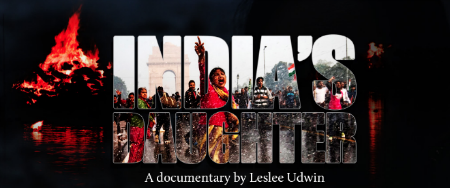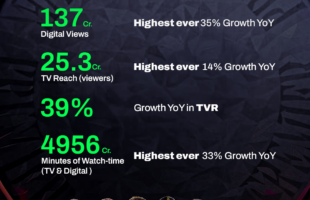India’s Daughter tells the story of the horrific Delhi gang rape of Nirbhaya which sent shockwaves around the world in December, 2012, and of the unprecedented protests and riots which this horrific event ignited throughout India, demanding changes in attitudes towards women.

Director-Producer Leslee Udwin describes what impelled her to make the documentary, “When news of this gang-rape hit our TV screens in December 2012, I was as shocked and upset as we all are when faced with such brazen abandon of the norms of ‘civilised’ society. But what actually inspired me to commit to the harrowing and difficult journey of making this film was the optimism occasioned by the reports that followed the rape. Courageous and impassioned ordinary men and women of India braved the December freeze to protest in unprecedented numbers, withstanding an onslaught of teargas shells, lathi charges and water canons, to make their cry of ‘enough is enough’ heard. In this regard, India led the world by example – and I LOVE India for this. In my lifetime, I can’t recall any other country standing up with such commitment and determination for women’s rights. I am thrilled that the NDTV has scheduled the film to air on International Women’s Day, 8 March.”
Dr. Prannoy Roy, Executive Co-Chairperson, NDTV said, “India’s Daughter is a documentary made by award winning filmmaker Leslee Udwin to explore in depth the causes of the inhuman crime against Nirbhaya and what has actually changed today in India. This will be broadcast on NDTV on March 8th, Women’s Day along with the BBC and other international channels. A worldwide India’s Daughter campaign against sexual violence and gender inequality will also be launched on Monday in New York by Meryl Streep, Anne Hathaway, Freida Pinto and others. In India too the film launches a campaign to fight for justice for Nirbhaya and to raise awareness to end sexual crimes in our country.
Nirbhaya’s parents have spoken extensively in this documentary. It also exposes the disgraceful attitude of the rapists and those who surround them. These are views in our society that need to be exposed and unambiguously condemned. The director has obtained all legal clearances needed from the authorities
This is a film that fights for and remembers Nirbhaya – and it honours the wishes of her parents who have seen the film. Let us all honour Nirbhaya and her parents and fight for an end to sexual exploitation and crimes with this film.”
With exclusive and unprecedented access, the film examines the values and mind-sets of the rapists. Mukesh Singh’s interview offers a revealing insight into his attitudes towards women and into why men rape.
In his interview, he says women are more responsible for rape than men, women should not travel late at night, nor should they go to discos and bars or wear the ‘wrong clothes’. He also claims that his execution will make life more dangerous for future rape victims. Referring to rape and responsibility, Singh said, “You can’t clap with one hand – it takes two hands. A decent girl won’t roam around at 9 o’clock at night. A girl is far more responsible for rape than a boy. Boy and girl are not equal. Housework and housekeeping is for girls, not roaming in discos and bars at night doing wrong things, wearing wrong clothes. About 20% of girls are good.”
Mukesh Singh suggested the rape and beatings were to teach Jyoti and her friend a lesson that they should not have been out late at night. And he criticised Jyoti for having fought back against her attackers. “When being raped, she shouldn’t fight back. She should just be silent and allow the rape. Then they’d have dropped her off after ‘doing her’, and only hit the boy.”
He said that executing him and the other convicted rapists/murderers will endanger future rape victims. “The death penalty will make things even more dangerous for girls. Now when they rape, they won’t leave the girl like we did. They will kill her. Before, they would rape and say, ‘Leave her, she won’t tell anyone.’ Now when they rape, especially the criminal types, they will just kill the girl. Death.”
Of her encounter with the rapists (during 31 hours of interviews in Tihar Jail, over 7 days), Udwin said, “The horrifying details of the rape had led me to expect monsters. The shock for me was discovering that the truth couldn’t be further from this. These were ordinary, apparently normal and certainly unremarkable men who shared a rigid and ‘learnt’ set of attitudes towards women. What I learned from these encounters, is the degree to which society itself is responsible for these men and for their actions. These rapists are not the disease, they are the symptoms. Gender inequality is the disease, and gender inequality is the solution. The only one.”
Two lawyers who defended the men convicted of Jyoti’s rape and murder also reveal insightful attitudes in their interviews.
In a previous televised interview, lawyer AP Singh said, “If my daughter or sister engaged in pre-marital activities and disgraced herself and allowed herself to lose face and character by doing such things, I would most certainly take this sort of sister or daughter to my farmhouse, and in front of my entire family, I would put petrol on her and set her alight.” And he confirms to Udwin in the documentary that his stance remains the same. “This is my stand. I still today stand on that reply.”
Another defence lawyer who acted in the case, ML Sharma, said, “In our society, we never allow our girls to come out from the house after 6.30 or 7.30 or 8.30 in the evening with any unknown person.”
“You are talking about man and woman as friends. Sorry, that doesn’t have any place in our society. We have the best culture. In our culture, there is no place for a woman.”
Jyoti’s mother sums up a widely held attitude: “Whenever there’s a crime, the girl is blamed, ‘She should not go out. She shouldn’t roam around so late or wear such clothes. It’s the boys who should be accused and asked why they do this. They shouldn’t do this.”
Writer and historian Dr Maria Misra of Oxford University said, “Her death has made a huge difference. I think that, first of all, it has really brought home the issue of the problems of the way young and independent women are perceived in Indian society. It’s opened up a debate in India that I think hasn’t been held publicly and widely about exactly what the relationship between men and women should be.”
Jyoti’s father said, “Jyoti has become a symbol. In death, she has lit such a torch that not only this country, but the whole world, got lit up. But at the same time, she posed a question. What is the meaning of ‘a woman’? How is she looked upon by society today? And I wish that whatever darkness there is in this world should be dispelled by this light.








